



Just say someone done that to you family to eat. would you like it, so why do we do it to them!
The Blog that keeps it real. Updated Regulary. Contact Me on : Harpreets12@hotmail.co.uk

Some religions believe that you can cleanse your soul by bathing at holy rivers etc. A Sikh must bath once a day for hygiene and to keep clean. How ever our bath is just to keep our body clean (it is a physical thing). But to clean our soul, we are given Gubani and Gurmantar

One who praises his God, receives honor. He drives out egotism from within himself, and enshrines the True Name within his mind. Through the True Word of the Guru's Bani, he chants the Glorious Praises of the Lord, and finds true peace. He is united with the Lord, after being separated for so long; the Guru, the Primal Being, unites him with the Lord. In this way, his filthy mind is cleansed and purified, and he meditates on the Name of the Lord. Ang 791 Sri Guru Granth Sahib Ji
One who cleanses himself within, knows the True Lord. Ang 414 Sri Guru Granth Sahib Ji


Historic fact:
When Sikh woman were captured by the Evil Mughal Government, they pierced her nose and put a ring on her as a sign of slavery (just like people do when they own a cow etc). They also put all types of noise making jewellery like bell ear rings etc so that when they made them dance, the noise made would add to their enticement. Our women used to be forced to wear this crap to satisfy the enemies’ evil desires, but now our women become slaves themselves.
She becomes His soul-bride forever, with the Word of the Shabad in her mind; she makes the Fear of God and the Love of God her ornaments and decorations. Ang 787 Sri Guru Granth Sahib Ji
Discarding worldly adornments, she meets her Husband Lord, and she celebrates joyfully with Him. She is adorned forever with the Name in her mind, and she does not have even an iota of filth. Ang 642 Sri Guru Granth Sahib Ji
The hair, moustache and beard are created within God's order. How can those who violate their natural form by cutting their hair ever be accepted by the Lord? Rehatnama Bhai Desa Singh
On each and every hair, the Lord abides. Ang 344 Sri Guru Granth Sahib Ji
Comb your hair twice daily and re-tie your turban each time your wear it. Rehatnama Bhai Nand Laal Jee
He who as a Sikh places a hat on their head; will be reborn seven times as a leper. Thankhaanama Bhai Nand Laal Jee
So that hat type starch things (so called turban) that people wear are of no use as they are the same as a hat. However to disguise themselves some Sikh warriors have worn hats etc for survival, even Sri Guru gobind Singh Ji dressed as a Muslim peer to escape from enemy hands to safety (So a hat as a disguise seems to be understandable).
Worship the Divine, Supreme Soul, with the intuitive peace and poise of the Guru. If the individual soul has faith in the Supreme Soul, then it shall obtain realization within its own home. The soul becomes steady, and does not waver, by the natural inclination of the Guru's Loving Will. Ang 87 Sri Guru Granth Sahib Ji
Lion of the Guru In natural form




In Kuljug, god has put the fire of Sin in our bodies, the objective of this game is to extinguish this fire and be content. The fire contains dark energies as such as greed, lust, ego, anger and attachment. These Dark energies keep up trapped in Sin and falsehood. They cause the destruction of our souls and bodies. Gurbani tells us that by reading Gurbani, doing Sangat, doing our Nitnem, asking Guru Ji for help, meditating at Amrit-vela, and doing Kirtan we can extinguish this fire. Only with Guru’s grace we get liberated for this fire, but once we do the false desires and world pleasure no longer bother us. One feels a soothing and poise peace, which brings contentment. But this test that God created is not easy, as temptations and evilness is all around us in society.
As a Sikh we may see and hear of our friends and family having boyfriends, girlfriends and sex before marriage. But we must remain distinct as Guru Ji said:
While your friends are coming back from clubbing, you must awake and worship the lord in order to destroy all the negative energies within us. In this way we will not be corrupted by falsehood and reach the true destination (Merging back with waheguru).
They are the Khalsa who destroy the five evils. They are the Khalsa who burn away delusion. Thankhaanama Bhai Nand Laal Jee
With the sword of spiritual wisdom, kill the five demons. Remain awake and aware to the Guru's Teachings. Ang 1413 Sri Guru Granth Sahib Ji
As your friends earn money by credit card frauds, selling intoxicants or whatever corrupted deed they do. You must have a respect job and give to charity.
Those who do not give one tenth of their earning to the Guru and earn a living of deceit and corruption. Listen carefully Nand Lal as Guru Gobind Singh speaks, they will suffer thousands of hells at death. Rehatnama Bhai Nand Laal Jee
Sikhs should not be selfish and greedy and must share with others. People spend thousands on luxuries while next man hasn’t even got a sack of rice, keep that in mind. A flash car will get you a speeding ticket, a 100 bags of rice sent to
Do not just eat on your own; always try to share with others. Rehatnama Bhai Desa Singh
Those who praise the Lord in the early hours of the morning and meditate on Him single-mindedly are the perfect kings; at the right time, they die fighting. Ang 145 Sri Guru Granth Sahib Ji
 eukemia. Kanwarjeet was born in
eukemia. Kanwarjeet was born in Kanwarjeet then went to
He has since been given 3 chemotherapies but there was not much effect on cancer cells so his doctor advised that he must undergo Bone Marrow Transplant. Unfortunately his bone marrow did not match with any of the immediate family members. He now needs to undergo Matched Unrelated Donor Therapy, facility currently unavailable in
His family has been very supportive but it is hard for them to arrange such a huge amount of money for their son’s treatment which might even go higher depending on his condition. As of now Kanwarjeet and his family are helpless. He is isolated from rest of the world being restricted to his room because of his poor resistance to infections. Only his wife goes in and out of his room and that also with great precautions. No one is allowed to meet him and he just sits in his room all day long by himself.
It is hard to imagine what is going through his mind. We are talking about a 26 year old, who has much ahead and with blessing of god and all of you we can make his dreams true and help him lead a healthy life. We as Kanwarjeet’s family and friends want to raise money for his treatment. We don’t want to leave any stone unturned. We have talked to many charities and companies for donations. We will really appreciate your help. If you have any other question please feel free to contact us.
To donate visit the below site:
http://helpkanwarjeet.org/help/

Once Namdev went to
Namdev was deeply hurt so he went to the back on the outside of the temple and started worshipping God. In his prayer he said:
Namdev also said:
"As Naamdev uttered the Glorious Praises of the Lord, the temple turned around to face the Lord's humble devotee" Ang 1164 Sri Guru Granth Sahib Ji
"The Lord turned the temple around to face Namdev and its back to the priests" Ang 1292 Sri Guru Granth Sahib Ji
That temple is still rotated. This is the symbol of the true love of God towards His true devotee.
While Naam Dayv was worshipping, he was grabbed and driven out.
I am of a low social class, O Lord;
why was I born into a family of fabric dyers? I picked up my blanket and went back,
to sit behind the temple.
As Naam Dayv uttered the Glorious Praises of the Lord,
the temple turned around to face the Lord's humble devotee.
Ang 1164 Sri Guru Granth Sahib Ji
Lust is a dark energy within us; it is in all of us and has been created by God as a part of his game. Lust causes many people to fail the test of life, as they remain attached to its pleasures and therefore remaining attached to falsehood (worldly illusion). Lust is extremely powerful and one of the main tools Maya (illusion of Kaljug) uses to keep us away from God. However with the Grace of Guru Ji and Sangat, lust can be overcome and therefore no longer remain a barrier between the mortal and God. We must pray to Guru Ji and ask him to help us overcome obstacles in the way of us and God.
Sexual desire and anger are diffused throughout the universe. Coming and going, people suffer in pain. Ang 129 Sri Guru Granth Sahib Ji
I am called a lustful being of the Dark Age of Kali Yuga. Ang 710 Sri Guru Granth Sahib Ji
The lustful, lecherous man desires many women, and he never stops peeking into the homes of others. Ang 672 Sri Guru Granth Sahib Ji
You are overflowing with sexual desire, and your intellect is stained with darkness; you are held in the grip of Shakti's power. Your eyes water, and your intellect and strength have left you; but still, your sexual desire churns and drives you on. Ang 93 Sri Guru Granth Sahib Ji
Day and night, you are engrossed in sexual desire, O my merchant friend, and your consciousness is blind to the Naam. Ang 75 Sri Guru Granth Sahib Ji
You filthy, heartless, lustful donkey! Haven't you heard of the Righteous Judge of Dharma? Ang 1001 Sri Guru Granth Sahib Ji
Lust, anger, egotism, jealousy and desire are eliminated by chanting the Name of the Lord. Ang 1389 Sri Guru Granth Sahib Ji
The Guru has cut out the sinful mistakes of sexual desire and anger, and my hopes have been fulfilled. Ang 108 Sri Guru Granth Sahib Ji
They control their sexual desires, and their lifestyle is the self-discipline of Truth. Ang 122 Sri Guru Granth Sahib Ji
First, the baby loves mother's milk;
second, he learns of his mother and father;
third, his brothers, sisters-in-law and sisters;
fourth, the love of play awakens.
Fifth, he runs after food and drink;
sixth, in his sexual desire, he does not respect social customs.
Seventh, he gathers wealth and dwells in his house;
eighth, he becomes angry, and his body is consumed.
Ninth, he turns grey and his breathing becomes labored;
tenth, he is cremated, and turns to ashes.
His companions send him off, crying out and lamenting.
The swan of the soul takes flight, and asks which way to go.
He came and he went, and now, even his name has died.
After he left, food was offered on leaves, and the birds were called to come and eat.
O Nanak, the self-willed manmukhs love the darkness.
Without the Guru, the world is drowning.
Ang 137 Sri Guru Granth Sahib Ji

Anyone who lives free from fear is called a ‘Nihang'. In Raag Aasa Guru Arjan dev Ji has described ‘Nihang' in this very manner:
“Being fearless, he becomes a ‘Nihang' (bold and daring person).” (Ang 392, SGGS)
Describing the Nihang the old Panth Prakaash states:
“A person who has forsaken the fear of death and is always ready to embrace martyrdom is called a Nihang.”
Nihang Singh’s are unattached to worldly materials. They wear blue clothes and tie a turban that is a foot high with a “dumala” on top of it. They always keep several weapons like chakar, khanda, bow & arrows and guns etc. on them. The Nihangs are the vanguards of the Sikh nation, whose vocation in life is to be warriors, protect the Gurdwaras and be on the forefront of battles. Though there is no concrete account of how the Nihangs came into being, it is told by many Singhs that one day the three Sahibzaadey (princes of Guru Gobind Singh Ji) were practicing their battle skills and the youngest of them all Baba Fateh Singh Ji also wanted to participate with his brothers. The other brothers replied: “At the moment you are too small.”
Baba Fateh Singh ji felt so let down that he went inside the palace and tied a dastaar (turban) as tall as 1ft. He put on a blue dress. Placing a Chakar (round disc carried on a belt or worn on the turban) on himself, he adorned himself with a small Khanda. Over his dastaar he wrapped a ‘dumalla' and held in his hand a spear, and to complete his warrior's dress he wore his Kirpaan. He then went to where his brothers were playing and said, “Now I don't look small.”
Observing him looking so handsome and beautiful, Guru Ji said: “From this dress the Nihangs will be formed.” For this reason up to this day Nihang Singhs are called ‘Guru Gobind Singh Ji's Laddleeaa Faujaa(n) (Beloved Army)'. Guru Gobind Singh Ji said that the Nihangs will be generous, and strictly adhere to Dharma. When the sword is wielded, it will give out sparks like fireworks. Fighting in the battlefield in this way it will seem like a crocodile is coming out of the sea:
They used to lead such an intrepid and unpredictable lifestyle that even their family did not know of their whereabouts. While riding or fighting they always uttered “Akaal, Akaal”. That is why they also became known as “Akaalis”. Their language (the distinct language of the Khalsa) indicated their positive (Chardikala) attitude.
By merely wearing a blue chola (dress) and learning Shastar Vidhiya (the art of Sikh weaponry) does not make one a Nihang. Unfortunately, in recent years, many people who don't follow the Khalsa rehat (way of life) strictly and lack good moral characters have brought shame to the ‘Nihang's by falsely claiming to be Nihangs or by simply associating themselves to the Nihang Singhs. In particular, in the UK, a group of young Sikhs call themselves Nihangs on the basis that they look the part and know how to swing a Kirpaan, however upon closer inspection, they do not have the strict Rehat (disciplined way of life), Naam abhiyaas, knowledge, and Jeevan (spiritual life) of true Nihangs.
A number of modern so called Nihang Singhs observe some rituals and practices, which are contrary to Gurmat, for example the consumption of marijuana (‘bhang'). These customs and 'traditions' crept in to Nihangs during the period when the Mahants (Hindu caretakers) managed and maintained our Gurdwaras in 18 th – early 20 th century. During this period the Sikh religion was distorted and many non-Sikh practices infiltrated into the Sikh Panth. Those who follow these anti-gurmat practices claim that they are ‘old traditions' (Puraatan Maryada) from the Guru's time; however Gurbani sheds true light on whether these practices and observances are Gurmat (according to the guru's teachings) or Manmat (self-willed).
‘Bhang' or ‘Sukhnidhaan', which is marijuana (cannabis) used by a large number of Nihangs nowadays is often justified through various means such as the quoting of tales and stories and then claiming these to be 'early traditions'. However, our Guru is eternal and with us forever. Why do we need to refer to stories and justifying traditions by claiming they are ‘old traditions' passed down when we have Guru Granth Sahib Ji with us to tell us what is in accordance to Gurmat. Gurbani clearly condemns the consumption of marijuana. Furthermore, medical studies bear out that consumption of marijuana and cannabis on regular basis leads to schizophrenia, and mental problems such as memory loss. The sad fact is that nowadays if you go to India you can observe some Sikhs claiming to be Nihangs, who drink ‘Bhang' have become mentally unstable.
“Tilang, First Mehl, Second House: One Universal Creator God. By The Grace Of The True Guru: The Fear of You, O Lord Waheguru, is my marijuana (cannabis); my consciousness is the pouch, which holds it. I have become an intoxicated hermit. My hands are my begging bowl; I am so hungry for the blessed vision of Your Darshan. (Ang 721, SGGS)
“The Great Giver has given the intoxicating drug of falsehood. The people are intoxicated; they have forgotten death, and they have fun for a few days. Those who do not use intoxicants are true; they dwell in the Court of Waheguru. ||1||” (Ang 15, SGGS)
Bhai Kahn Singh Ji beautifully describes the true character of an Akali as someone who associates themselves to Akal (the Immortal). This passage in particular is used relating to Nihang Singhs in the Gur Shabad Ratnaakar Mahaan Kosh (1931) :
“The Khalsa belongs to Vaheguru.
He who loves all and whose ways are distinct from all,
He who eats only that which he earns and considers begging a sin,
He who in difficult times has faith in True Guru and remains happy,
He who guards the Sikh temples without a desire for material gain,
He who is always eager to fight a just and righteous war,
He who worships only the Timeless one and not gods or goddesses,
Know such a Sikh of the tenth Guru as an Akali.”
In summary it can be concluded that Nihangs are the official army of the Sikh Panth, who are trained in Shastar Vidiya and live a life dedicated to serving the Sikh Panth through their battle skills. They were blessed by Guru Gobind Singh Ji to remain distinct and be fearless warriors, like an official unpaid army without the desire of material gain.
 The true Nihang Singhs who observe the Sikh Rehat Maryada (Sikh way of life) and keep a high moral character and serve to protect the Gurdwaras and the Sikh community (and humaninity) should be given respect and acknowledged as the ‘Guru's laddleeaa faujaan(n)' (the Guru's Beloved army). However, we should also be wary not to confuse Nihang Singhs for “Nangs”, impostors, who dress in blue attire, practice Shastar Vidiya (Sikh weaponry), follow ‘Sanatan mat' (ancient Hindu traditions and belief) and have little or no respect for living the Sikh Rehat and maintaining a high moral character. In particular, in the UK, the small group of people claiming to be ‘Nihang Singhs' are teaching young Sikhs their own version of Sikh history and philosophy which is far from Gurbani's teachings. “Nangs” have a lax approach to Sikh Rehat and justify using drugs, alcohol and meat. Many of these “Nangs” are using the university scene and Sikh camps to spread their distorted version of Sikhi and confuse young Sikhs. Let us be aware of the distinction between a true Nihang and a “Nang” (fake Nihang Singh).
The true Nihang Singhs who observe the Sikh Rehat Maryada (Sikh way of life) and keep a high moral character and serve to protect the Gurdwaras and the Sikh community (and humaninity) should be given respect and acknowledged as the ‘Guru's laddleeaa faujaan(n)' (the Guru's Beloved army). However, we should also be wary not to confuse Nihang Singhs for “Nangs”, impostors, who dress in blue attire, practice Shastar Vidiya (Sikh weaponry), follow ‘Sanatan mat' (ancient Hindu traditions and belief) and have little or no respect for living the Sikh Rehat and maintaining a high moral character. In particular, in the UK, the small group of people claiming to be ‘Nihang Singhs' are teaching young Sikhs their own version of Sikh history and philosophy which is far from Gurbani's teachings. “Nangs” have a lax approach to Sikh Rehat and justify using drugs, alcohol and meat. Many of these “Nangs” are using the university scene and Sikh camps to spread their distorted version of Sikhi and confuse young Sikhs. Let us be aware of the distinction between a true Nihang and a “Nang” (fake Nihang Singh).
 Not trying to steal the wind from the Greek sails but is there not another battle that is overlooked that is as heroic, if not even more uneven in its opposing sides, when 40 Sikhs at the battle of Chamkaur, fought the entire imperial army of the Moghul ruler Aurangzeb?
Not trying to steal the wind from the Greek sails but is there not another battle that is overlooked that is as heroic, if not even more uneven in its opposing sides, when 40 Sikhs at the battle of Chamkaur, fought the entire imperial army of the Moghul ruler Aurangzeb? A few points to note, it wasn’t at all a band of 300 Spartans surrounded by millions of Persians, the pass at Thermopylae is a small and narrow area where only a few hundred soldiers can fight at a time. The 300 were actually joined by 700 Thespians. With all due respect to the Persian and Greek armies, the Spartans cannot be given all of the credit. The Athenians burned the Persian fleet in the sea at
A few points to note, it wasn’t at all a band of 300 Spartans surrounded by millions of Persians, the pass at Thermopylae is a small and narrow area where only a few hundred soldiers can fight at a time. The 300 were actually joined by 700 Thespians. With all due respect to the Persian and Greek armies, the Spartans cannot be given all of the credit. The Athenians burned the Persian fleet in the sea at  nkled, there was a great hue and cry in the world.
nkled, there was a great hue and cry in the world. Click to View Photograph Galllery of Desecration Sri Rakabganj Sahib, Delhi (KP) - Thirty years ago, thirteen GurSikhs laid down their lives in the city of Amritsar Sahib when the psuedo-Nirankari heretics began desecrating and insulting Sri Guru Granth Sahib Ji. The Sikh Nation considers Guru Granth Sahib Ji the living embodiment of the ten Gurus. Utmost respect and reverence is given to the sacred Saroops that contain the Holy Bani of our Gurus and Bhagats (saints). Three decades later, our very own institutions, are now the ones who are desecrating the Holy Saroops. "Interestingly, the Prof. Darshan Singh & Missionary lobby is totally silent about the ongoing disrespect by Sarna and Company. Instead, they are busy criticising the Bani of Dasam Patshah, and internally promoting the likes of Chaman Lal and Hari Ratan Yukta."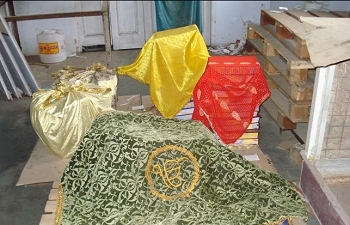
Holy Saroops of Guru Granth Sahib Ji stacked in a filthy corner of the complex
Panthic Weekly was given photographic and video evidence by Sewadars of Guru Granth Sahib Satkar Committee (India) and the Shahbaaz Khalsa organization on the reckless beadbi that is occurring at the premises of “Gur Updesh Printers”, the official printing establishment of the Delhi Sikh Gurdwara Management Committee (DSGMC) under Paramjit Sarna and company.
When the DSGMC found out this evidence was being collected, they quickly confiscated the equipment of the sevadars—but fortunately, other equipment was still in their possession with which they collected this evidence of violations.
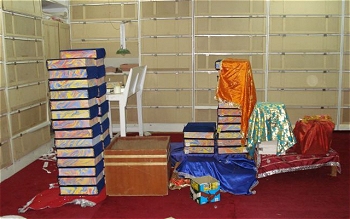
Uncovered Guru Granth Sahib Ji stacked like bricks on the ground
Ironically, the DSGMC has a budget of over 1 Billion (100 crore) rupees to manage Delhi based Gurdwaras, Sikh schools, and colleges. The massive complex at Gurdwara Rakab Ganj Sahib, besides the historic Gurdwara Sahib, contains the well known Lakhi Shah Vanjara Hall, DSGMC offices, and the publishing center known as Gur Updesh Printers.
Gurdwara Rakab Ganj Sahib is the sacred site where Guru Teg Bahadur Sahib Ji’s body was cremated by Bhai Lakhi Shah Vanjara in 1675.
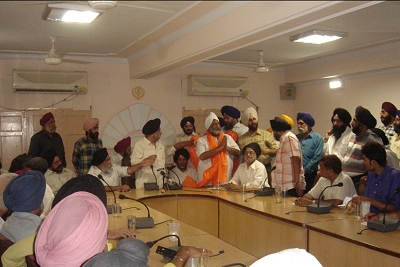
As Guru Ji's Saroops are being desecrated, the Siyaasi-masands of the DSGMC enjoy thier luxurious air-conditioned offices in the Gurdwara Rakabganj Sahib complex
Due to mis-management and carelessness, this once serene and sparkling complex is now under the virtual control of the “siyaasi-masands’ of the DSGMC.
For the last several years, the committee has been outsourcing Gurdwara seva to non-Sikhs and migrant Biharis. Their presence is known from the never ending line of discarded tobacco-bettle nut packs littering the complex.
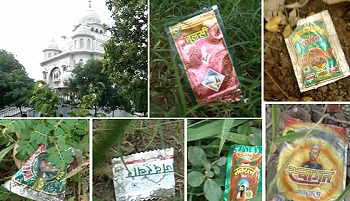
Gurdwara Rakabganj Sahib complex littered with discarded tobacco pouches
In 2005, PW published an article “Bihari migrants desecrate premises of Gurdwara Rakab Ganj Sahib” http://www.panthic.org/news/125/ARTICLE/2097/2005-12-18.html which was an expose done by Shahbaaz Khalsa that illustrated how the Gurdwara Sahib premises was being misused and desecrated by these Bihari migrants (often referred to as 'Bhaeeyas'). These migrants continue to carry and chew tobacco on the premises of the sacred complex.
Per Sikh Maryada (Code of Conduct), alcohol, tobacco, and similar paraphernalia are not to be brought in or consumed on any Gurdwara premises. These same migrants are also in charge of the Langar Halls and other key duties throughout the complex.
Disrespect of Saroops
When visitors at the complex come to get Saroops of Guru Granth Sahib Ji, they are taken to a well kept hall with dozens and dozens of Saroops placed on Sukhasan platforms. Yet undercover footage of the same complex revealed that Bhayeeays strolled through the Sukhasan room without covering their heads. This is a major violation of Sikh Maryada.
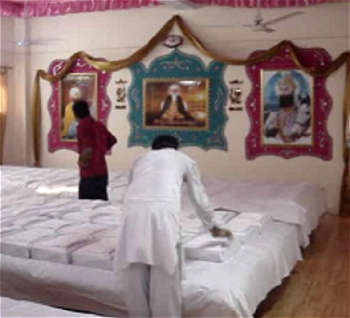
Employees walk around with their heads uncovered in the Sukhasan Room for Guru Granth Sahib Ji
Visitors are further shocked to know that on one side, luxurious offices with marble floors, and expensive furniture are provided to Paramjit Sarna and his DSGMC staff, but behind the Sukhasan room, Sri Guru Granth Sahib Ji’s Saroops are being printed in sub-standard unkempt areas littered with rubbish and scrap.
When the sewadars of the Satkar Committee visited the printing areas, they were shocked to see so many uncovered Saroops of Sri Guru Granth Sahib Ji stacked like bricks. Many of these Saroops were literally touching the ground, with just a thin rumala between them.
| “How can this go on in an organization whose budget is in the crores of rupees? " |
Although, there was the separate Sukhasan room in the complex, it was not being utilized for these Saroops, nor was it big enough to store all of these Saroops. The Satkar Committee sewadars spent several hours relocating some of the Saroops to the Sukhasam room, so they can be given proper respect, but only so many could be moved.
Stacks of Saroops Everywhere
As the sewadars moved throughout the complex, they saw more and more stacks everywhere, many left uncovered, and others carelessly covered by a single white bed sheet. The sewadars estimated over 300 Saroops in many of these giant stacks. There were dozens of these stacks throughout the hall.
Bhai Balbir Singh of the Satkar Committee estimated that all in all there were several thousand Saroops of Sri Guru Granth Sahib Ji being stored in that shabby complex, all without proper maryada and respect.
One of the Satkar Committee sevadars exclaimed, “How can this go on in an organization whose budget is in the crores of rupees? If they can afford, luxurious offices for themselves, why can’t [they afford] the same for our King of Kings? Why is Guru Maharaj being kept in this condition? This is totally unexcusable!”
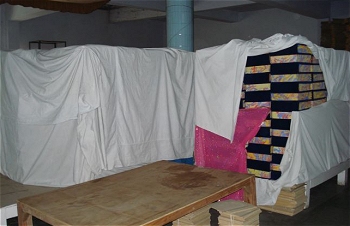
Hundereds of Saroops of Guru Granth Sahib Ji stacked like bricks, dozens of such stacks were in the comple
Angs of Guru Granth Sahib tossed in Trash
Another shocking scene the sewadars encountered was that damaged or misprinted angs of Guru Granth Sahib were thrown into rubbish bins, along with normal paper waste. These Angs contained the sacred verses of Gurbani, yet they were being treated like trash.
The sewadars also saw one saroop of Sri Guru Granth Sahib Ji that had been parkash on a dirty desk, there were no rumallas or chaur sahib for that open saroop. It was left unattended, with a paper inserted in it as a place holder. Again, another huge violation of Sikh Maryada.
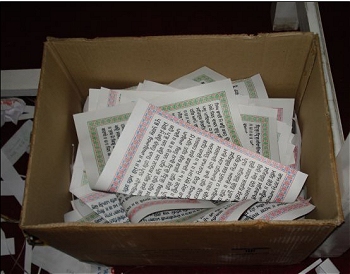
Discarded Angs of Guru Granth Sahib Ji thrown into rubbish bins.
Another violations the sewadars noted was that complete single volume Saroops were being printer in Hindi and Urdu. Sri Akal Takht directive does not allow single volumes of Guru Granth Sahib to be printed in any langauge other than Gurmukhi - only Senchees are allowed.
Sewadars of the Guru Granth Sahib Satkar Committee and the Shahbaaz Khalsa recently held a press conference in which this photographic evidence was handed to the press and then submitted to Sri Akal Takht Sahib so that this beadbi (extreme disrespect) could be stopped as soon as possible. Sadly, neither the appointed Jathedar Vedanti nor the press has taken notice of these violations.
Both organizations have appealed to the Panth at large, that pressure should be put on appointed Jathedar Vedanti to take stern action against the DSGMC executives so that this beadbi in their complex can be stopped.
To the Sikh Nation there is nothing more sacred than our sacred Gurbani, it is the very form of our Guru. That is why even the paper and the ink it is written with is called blessed.
ਧੰਨੁ ਸੁ ਕਾਗਦੁ ਕਲਮ ਧੰਨੁ ਧਨੁ ਭਾਂਡਾ ਧਨੁ ਮਸੁ ॥
Blessed is the paper, blessed is the pen, blessed is the inkwell, and blessed is the ink.
ਧਨੁ ਲੇਖਾਰੀ ਨਾਨਕਾ ਜਿਨਿ ਨਾਮੁ ਲਿਖਾਇਆ ਸਚੁ ॥1॥
Blessed is the writer, O Nanak, who writes the True Name. ||1||
While there are those who will sacrifice everything for the respect and honor of this Sacred Holy Bani, there are many who will look the other way since it is much easier and fashionable in this day and age.
Historically, it was well known that Sikhs gained their power from the sacred Gurbani. It was so revered that Sikh kings such as Raja Ranjit Singh would always have Guru Granth Sahib and Dasam Granth Sahib on thrones higher than them, generals would take both saroops on elephants into battle as commander-in-chief.
These very detractors of the Panth have attacked not only Sri Dasam Granth Sahib, but are also undermining the reverance and respect accorded to Guru Granth Sahib Ji. The 13 Shaheeds of '78 and others throughout history gave their lives to stop this very type of beadbi happening today. In the future, will there be any Sikhs left that stand up for their Guru's respect?
 When we take Amrit we take a vow and make a promise to Guru Ji. We promise not to eat meat, not to take drugs for intoxication, not to have sexual relations until after marriage and not to cut our hair. Guru Ji blesses us and puts his hand over us, but if we go back on our vows and break our promise we loose the Gurus blessings. In order to receive the Gurus blessings again we must remake promises and take Amrit again.
When we take Amrit we take a vow and make a promise to Guru Ji. We promise not to eat meat, not to take drugs for intoxication, not to have sexual relations until after marriage and not to cut our hair. Guru Ji blesses us and puts his hand over us, but if we go back on our vows and break our promise we loose the Gurus blessings. In order to receive the Gurus blessings again we must remake promises and take Amrit again.Some are lovers of beautiful young women; emotional attachment to Maya is very dear to them. The unfortunate self-willed manmukhs remain asleep. O Nanak, those who intuitively serve their Guru, have perfect destiny. Sri Guru Granth Sahib Ji Ang 569
Humility, self-control and purity have run away; people eat the uneatable, forbidden food. Sri Guru Granth Sahib Ji Ang 1243
Those who gamble or drink alcohol will suffer in hell.
One person brings a full bottle, and another fills his cup. Drinking the wine, his intelligence departs, and madness enters his mind; he cannot distinguish between his own and others, and he is struck down by his Lord and Master. Sri Guru Granth Sahib Ji Ang 554
Those beards are true, which brush the feet of the True Guru... True are the faces and true are the beards, of those who speak the Truth and live the Truth. Sri Guru Granth Sahib Ji Ang 1413
 On Monday 14 April the BBC decided to hold a debate on whether or not there should be a separate Sikh State, Khalistan. Nihal presented the show on BBC Asian Network between 9-10am. The two invited to speak on the subject were Jagdeesh Singh, a Sikh activist from Slough and Deshpal Panesar, an employment law barrister from London.
On Monday 14 April the BBC decided to hold a debate on whether or not there should be a separate Sikh State, Khalistan. Nihal presented the show on BBC Asian Network between 9-10am. The two invited to speak on the subject were Jagdeesh Singh, a Sikh activist from Slough and Deshpal Panesar, an employment law barrister from London.
